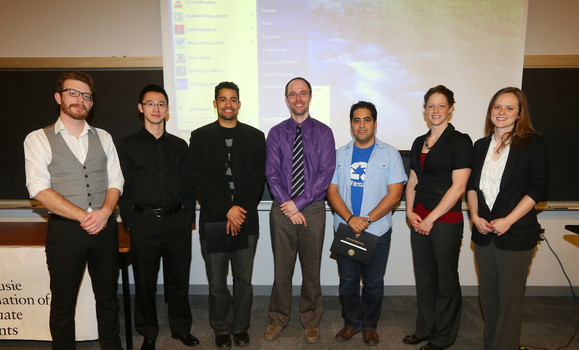The elevator pitch was taken to a new level at last week’s 3-Minute Thesis (3MT) competition at Dalhousie, as some of the university’s top graduate students expertly summed up their entire theses before the buzzer went off.
The skills development activity offered graduate students the opportunity to explain their research project in three minutes with scholarships up for grabs. It started with a full day of preliminary rounds last Wednesday. With six heats boasting more than 10 students each, the judges faced the difficult task of choosing just one contestant from each heat to move on the final round. (One round was so close it actually produced a tie.)
“It was a really busy day. There were lots of students, but it went really smoothly,” said Katelynn Northam, recruitment assistant with the Faculty of Graduate Studies and an organizer of the 3MT competition.
The seven finalists competed Thursday evening in the Tupper Building to a crowd of more than 50, as well as an expert panel of judges: Bernie Boudreau, dean of Graduate Studies; Bonnie Neuman, vice-president Student Services; and Richard Donald, associate dean of external strategic partnerships and interim associate dean of research at the Faculty of Agriculture.
The competitors were judged not on the content of their research project, but simply on their communication skills. The judging criteria was based on whether the language was appropriate to an intelligent but non-specialist audience, as well as if the presentation helped the audience to understand the research and made them want to learn more.
“They’re not doing raps, they’re not doing poems, they are just communicating,” Northam said before the final competition. The students were also allowed one PowerPoint slide, with no video or special effects.
A winning approach
Jacob Cookey, a resident in the Department of Psychiatry and student in both the Clinician Investigator Program and Clinician Scientist Graduate Program, spent his three minutes explaining his research about the affects of cannabis use on developing schizophrenia. Using MRI technology, he is tracing water molecules through the brain to show how cannabis use may result in an increased risk of schizophrenia.
He walked away with first prize, which included a speaking spot at TEDx Nova Scotia this past weekend and $1,000.
“His was an almost perfect presentation, in the sense that he used not a word of jargon,” said Dr. Boudreau. “It was a perfectly comprehensible presentation for anyone in the audience.”
“There’s so much good scientific work going on around the world, and here at Dal, so presenting that to a wider audience in the simple straightforward way is extremely important if you want anything to become of that research,” said Dr. Cookey. His research project could have potential policy implications, depending on his findings.
Babak Razaghi, from the Department of Microbiology and Immunology, used Justin Bieber references to explain his research about the effects of free radicals on the heart. He won hearts of the audience and the judges, as he took home the runner-up prize of $500, as well as the People’s Choice Award of $250. He also received a speaking spot at TEDx Nova Scotia.
Although Dr. Cookey’s straightforward presentation and Razaghi’s Bieber references took home the prizes, the judges faced a difficult decision, as all seven finalists did a great job condensing and communicating their research.

The seven finalists (left to right): André Forget (Department of English), Weixi Shu (Faculty of Agriculture), Jacob Cookey (Clinical Science), Philippe Magown (Department of Medical Neuroscience), Babak Razaghi (Department of Microbiology and Immunology), Audrey Prayal-Brown (Department of Kinesiology), Jean Burrows (Department of Kinesiology).
“It goes to show what great grad students we have here at Dalhousie and it’s a great opportunity to celebrate what our students are working on,” said Northam.
With the first competition a success, Northam says the university plans to make it an annual tradition, especially with discussions about a possible nationwide competition being put together.
Watch Jacob Cookey’s presentation below; the remaining finalists' speeches will all be uploaded to YouTube and the Grad Studies website in the weeks ahead.

